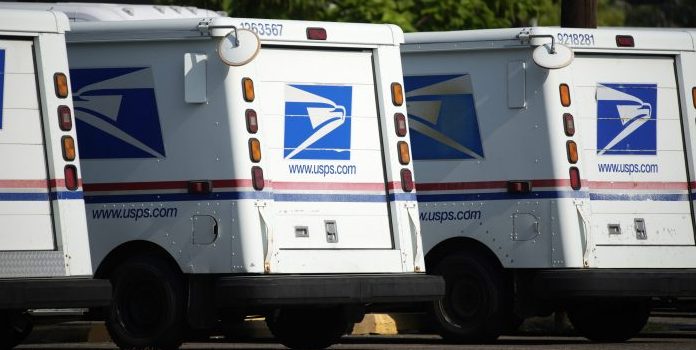(Headline USA) Congress would lift onerous budget requirements that have helped push the Postal Service deeply into debt and would require it to continue delivering mail six days per week under bipartisan legislation the House approved Tuesday.
The election-year bill, coming at a time of widespread complaints about slower mail service, would also require the Postal Service to display online how efficiently it delivers mail to communities.
The Postal Service is supposed to sustain itself with postage sales and other services, but has suffered 14 straight years of losses.
The reasons include growing workers’ compensation and benefit costs plus steady declines in mail volume, even as it delivers to 1 million additional locations every year.
However, more recently, there has been growing alarm over reports that the semi-public agency has branched out into domestic surveillance.
Postal Service hacking into hundreds of seized mobile devices, tracking users’ social media posts | Just The News https://t.co/e1ixP2CUL5
— Just the News (@JustTheNews) February 3, 2022
It is unknown how much of the USPS budget is allotted to espionage efforts, including its alleged hacking of mobile devices and monitoring of social media.
The United States Postal Inspection Service’s Internet Covert Operations Program is understood to be a joint operation with the Department of Homeland Security.
It reportedly was engaged in operations to monitor conservative donors of a privately funded effort to build a border wall during the Trump administration.
More recently, it has been dispatched to monitor discussions of planned protests and “inflammatory postings.”
“It’s not at all clear why their mandate would include monitoring of social media that’s unrelated to use of the postal system,” Rachel Levinson–Waldman, deputy director of the far-left Brennan Center for Justice’s liberty and national security program told Yahoo News.
‘A RARE SHOW OF PARTISAN AGREEMENT…’
Postal Service officials have said without congressional action, it would run out of cash by 2024, a frequent warning from the service. It has estimated it will lose $160 billion over the coming decade.
Those pressures have brought the two parties together for a measure aimed at helping the Postal Service, its employees, businesses that use it and disgruntled voters who rely on it for delivery of prescription drugs, checks and other packages.
Tuesday’s vote was 342-92, a rare show of partisan agreement, with all Democrats and most Republicans backing it.
Rep. Carolyn Maloney, D-N.Y., chairwoman of the House Oversight and Reform Committee, said the Postal Service “provides service to every American, no matter where they live, binding us together in a way no other organization does.”
Rep. James Comer of Kentucky, that committee’s top Republican, said “the days of letters alone driving Postal Service revenue are not coming back.” The bill, he said, will “help it succeed into the 21st century.”
Sen. Gary Peters, D-Mich., chairman of the Senate Homeland Security and Governmental Affairs Committee, said he expects his chamber to “move quickly” on the measure.
Senate Majority Leader Chuck Schumer, D-N.Y., said he’s planning a vote before a recess that starts after next week.
The bill has 14 GOP sponsors and, with strong Democratic support expected, seems on track to gain the 60 votes most bills need for Senate passage.
A CONSTANT CONUNDRUM
Over the years, some lawmakers have wanted to impose tougher requirements for faster service by the Postal Service, while others have favored privatizing some services.
The compromise omits controversial proposals.
There has been talk over the years of reducing deliveries to five days per week, which could save more than $1 billion annually, according to the Government Accountability Office, the accounting agency of Congress. That idea has proven politically toxic and has not been pursued.
The bill would also require the Postal Service to set up an online “dashboard” that would be searchable by zip code to show how long it takes to deliver letters and packages.
The measure is supported by President Joe Biden, the Postal Service, postal worker unions, industries that use the service and others.
Postmaster General Louis DeJoy said the bill would help “provide the American people with the delivery service they expect and deserve.”
Mark Dimondstein, president of the American Postal Workers Union, called the bill “outstanding” in an interview.
One of the bill’s few critics was Rep. Darrell Issa, R-Calif., who said its changes fell short.
“It has failed to make a profit, it has failed the American people, and everyone who has a mailbox knows it,” he said.
PERPETUAL INSOLVENCY AND COST-CUTTING
The bill would end a requirement that the Postal Service finance, in advance, health care benefits for current and retired workers for the next 75 years.
That obligation, which private companies and federal agencies do not face, was imposed in 2006. It ended up being the year that the Postal Service’s mail volume peaked and its financial fortunes steadily worsened.
The Postal Service hasn’t made those payments since 2012.
Overall it faces unpaid obligations of $63 billion, according to its most recent annual report. The bill forgives much of that debt.
Instead of those obligations, the Postal Service would pay current retirees’ actual health care costs that aren’t covered by Medicare, the federal health insurance program for older people.
The legislation would also require future Postal Service retirees to enroll in Medicare, which only about 3 in 4 do now.
The shift would save the Postal Service money by having Medicare cover much of its costs, shuffling it instead to another federal program that faces constant concerns over insolvency but is more universally embraced.
Proponents say the changes would save tens of billions of dollars over the next decade.
Since the Postal Service has its own finance system, it is not counted as part of the federal budget.
But the nonpartisan Congressional Budget Office said the bill would save the government $1 billion over the next 10 years. That is largely because retirees’ prescription drug expenses under Medicare would be covered by required discounts from pharmaceutical makers.
Adapted from reporting by the Associated Press

